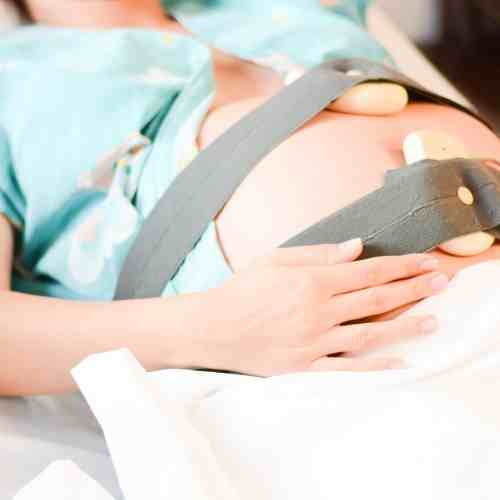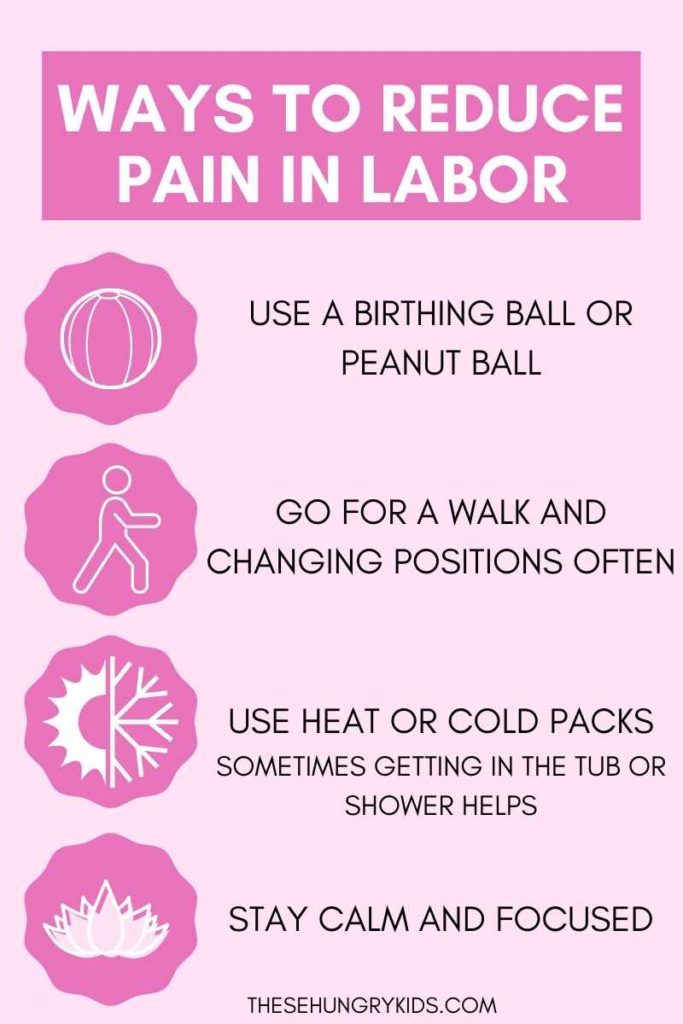These shocking things expectant moms should know about labor and delivery come to you from an experienced labor nurse and mom! Learn what to expect during birth and what you should plan for during labor and childbirth.
Delivering your child is a beautiful experience! If you’re an expectant mom or dad, you’ve probably though about how your labor and birth will go.
It’s hard to imagine what it will feel like or be like when you deliver your baby. Movies and TV shows often show a glorified version of what is really to come.
And for some reason, your friends and family members only want to share horror stories!
Since pregnancy can be so uncomfortable, it’s exciting to think about giving birth to your baby. You’ve probably picked the perfect baby name, found the most adorable outfit, and are ready for whatever lies ahead!
When I’m not at home with my kids, I work as a labor and delivery nurse. I love my job, and I find it so rewarding.
There are many things that new parents don’t expect, and I’m often the one to break the news. That inspired me to write this post – the most unexpected things about childbirth!
Disclaimer: everyone has a different experience when it comes to labor and delivery. My mission is to prepare and inform, not advise. The information in this post is purely for entertainment and is not meant to replace the advice of a medical professional. I always adhere to HIPPAA policies, any similarities to yours or anyone else’s story is purely coincidental. Please see my disclosure policy for more information. This post contains affiliate links for your convenience. This means if a purchase is made using links on this page, I may earn a small commission at no additional cost to you.

What expectant parents should know about labor and childbirth
1. Things may not go according to the birth plan
In fact, it is kind of a joke in the labor and delivery world when a mom comes in with an extensive birth plan. It usually means that things will not be going according to plan. It’s sort of a curse!
Babies can be very unpredictable. Sometimes they get stuck in weird positions or have severe drops in their heart rate that prevent labor from continuing safely.
Also, sometimes moms develop infections, become pre-eclamptic, or have other complications that aren’t safe for a vaginal birth. In those cases, your provider may discuss a cesarean as being the best option for keeping both baby and mom healthy.
The plan should always be “healthy mom, healthy baby.” You can certainly outline how you would like things to go, but also have realistic expectations that it’s not always possible.
2. However you give birth is beautiful and amazing
Whether you give birth vaginally or by c-section, you are amazing. I mean, you just grew a whole human! Give yourself a pat on the back!
It can be traumatic to have a delivery that didn’t go according to your plans. Whether you planned for a c-section and had a vaginal birth, or vice versa, your baby’s birth was special and incredible.
3. Educate yourself, but don’t stress yourself out
It’s easy to be overwhelmed with information! There is so much to childbirth.
Educate yourself on the basics, but don’t go overboard. That’s why your doctors, midwives and nurses went through so much schooling!
You may want to familiarize yourself with some labor terms before birth, so that you can ask questions and be informed. You can also take classes beforehand so that you know what to expect.
4. You might feel contractions in places other than your belly
It may extend to your back, hips, and legs! Sometimes it is a sign the baby is not positioned right.
With my last baby, I had awful contraction pain down my left leg. It was the weirdest thing! My left foot and leg would go numb and feel like it was on fire with contractions. This was due to how the baby was pushing on a nerve in my hip.
Once I started pushing and got her off of whatever nerve she was laying on, I felt so much relief!
Back pain is often a sign that the baby is “occiput posterior,” or “sunny side up.”
If you’re laying on your back, the best way for the baby to be born is looking straight at the ground. They just seem to fit better that way. If your baby is looking up at the ceiling, the back of their head may be hitting your tailbone and spine, causing a ton of back pain!
The best way to fix it is to move, move, move! Lots of position changes, walking, and relaxing the best you can may encourage the baby to flip.

5. Labor can last days
Typically, active labor does not last days. But early labor can come and go for a long time before active labor begins!
If this happens to you, my advice is as follows:
- Rest when you can. Take naps when contractions slow down and try to get some good, solid sleep.
- Be active as much as possible
- Stay calm
- Eat and drink when you are able to keep your energy levels high
There are several phases to labor, and they each bring their own set of challenges! You can learn more about the phases of labor and what to do about them here.
6. Birth can be kind of…yucky
From amniotic fluid, to blood, to vernix, and more, brace yourself for things to get a little messy.
If you come with your own clothing for labor, know that you may want to throw it out after. Keep this in mind if you plan to have your own blankets, pillows, socks, bra, and/or labor gown.
7. Sometimes when your water breaks, there is baby poop in it
This is called meconium, and while it is not a cause for panic, it can be a cause for concern.
When your water breaks, one of the first questions your doctor will ask is, “what color is it?”
Amniotic fluid should be clear or with a very slight blood tinge to it. If it is yellow, brown, or has brown or black particles in it, it could be a sign that the baby is stressed out.
8. Everyone has an opinion for the best way to give birth
People love to share their birth stories! So what if your Aunt Linda had home births? And who cares if your neighbor Stephanie went “all natural?”
You can give birth however you see fit! If you want an epidural, cool! If you desire a hospital birth, great! Your story is your story. Try not to be influenced by everyone else’s!
9. Your water doesn’t always break when contractions start
Sometimes your water breaks, but no contractions come at all! In these cases, your doctor may recommend inducing labor.
Many times your water breaks after contractions start! This often makes the contractions stronger.
10. Your water may not break at all
Some babies are born in the sac, or en caul!
It’s rare, but sometimes the baby is born entirely in the sac. Your provider will break the bag of water after birth.
11. It is common to be connected to several monitors during labor
You may need a monitor for the baby, for contractions, an IV, a blood pressure cuff, a catheter, and/or a pulse oximeter during labor.
Of course, sometimes you don’t need any of these! But if you are induced, if the baby is not tolerating labor well, if there are complications, or if you have an epidural, you may need extra monitoring.

12. Sometimes your baby will need to be monitored with internal monitors
There are two types of internal monitors: one that checks baby’s heartbeat and one that measures contractions.
If your baby’s heartbeat is dropping too low too often, your team may put a tiny electrode on the baby’s head to get an exact measurement of the heartbeat.
Your team may also place a catheter into the uterus. This catheter measures the strength of the contraction, as well as how frequently they are happening and how long they are. The monitors that go on top of the belly cannot measure strength.
This catheter can also be used to give some fluid back to baby through something called an amnioinfusion. An amnioinfusion can be helpful if the heart rate dips happened once the mother’s water has broken. It may be that the baby is laying on the umbilical cord funny, and when some fluid is added back in, the pressure on the umbilical cord can be alleviated.
13. It is exhausting, and a lot of physical demand
So many times, moms get an epidural and ask if the epidural makes you sleepy.
But actually, just being in pain is exhausting and when the pain stops, the body wants to rest.
The first few days after delivery you’ll feel like you ran a marathon! Take it easy and rest as much as you can, whenever you can.
14. You should ask whatever questions come to mind
Don’t feel like you are a burden to your care team! They are there to help.
When you have a question, ask it! Even if it seems small, silly, or the answer seems obvious.
15. It is normal to poop when you’re pushing
This is a shock to many women! But when you push, it is extremely normal to poop.
In fact, it’s actually a sign that you are pushing well! Don’t be afraid of it, just push with all your might!
16. Sometimes pushing can take hours
Especially if it’s your first baby!
It’s very normal for moms to push up to three hours. According to this article from Sutter Health, first time moms often push 1-2 hours.
Typically, the second delivery is much faster than the first, but it also depends on many factors, including the baby’s position.
Of course, there are exceptions to this and some moms only push a few times! But it is not abnormal to push for over an hour when it is your first baby.
17. There are ways to ease the pain without medications
You don’t have to lay in bed and suffer!
Using birthing balls, a shower or tub, heat and cold, and frequent position changes can help alleviate discomfort.
You can check out this post to learn all the ways you can labor with less pain.

18. Epidurals get rid of *most* but not *all* of the discomfort of labor
Epidurals can be a fantastic pain relief tool.
But towards the end of labor, many moms say the epidural has “worn off.”
This is one of many epidural myths that I busted in this post, but it is true that you will most likely feel discomfort towards the end of labor! That is because the baby’s head is pushing on nerves that cause you to feel an intense amount of pressure.
This pressure is a good thing, and actually will help you push! Feeling a lot of rectal pressure is often a sign that labor is coming to an end.
19. Sometimes epidurals don’t work well
It’s possible that the epidural just doesn’t work great on one side or on one part of your body.
If that’s the case for you, you can ask the anesthesia team to take a look. They may be able to give you additional medication through the epidural catheter, or can adjust the catheter to give you more coverage.

20. There are medications other than an epidural to help with the pain
You’ll have to talk to your doctor to see what’s available, but there are a few different medications that can help with your pain.
Some medications are better for early labor, while others are better towards the end. Ask your team what is available to you if you need something.
21. You can ask for a different staff member if things aren’t working out
Do you feel that someone on your care team isn’t taking your care seriously?
You can ask for a different staff member to care for you. Always advocate for yourself.
During my first delivery, I had a resident on my care team that was incredibly rude and abrasive to me. Everyone in the room was appalled by her tone and the way she spoke to me.
Her cervical exams were also very rough, and caused me to vomit every time. She even performed a cervical exam after I told her to stop!
I demanded she not come back into my room, and my obstetrician and nurse agreed that would be best. My delivery went much better after she was gone! I was able to relax and focus better when a different provider was present.
The people that are involved in your birth are important. If someone does not respect you or make you feel safe, ask them to leave.
22. The doctor may only be there at the very end
Many times, the doctor comes in the room at the start of pushing, and doesn’t return until the baby is almost born. They may be managing a few different patients, and may not be able to sit in the room throughout pushing.
Your nurse should not leave your side during pushing, though. He or she will be your biggest cheerleader!
23. If you are breastfeeding, they’ll want you to start pretty soon after birth
Typically, the baby should get to breast within an hour or so after birth.
The first latch can be difficult, so don’t panic if it takes a little extra work. There is a ton to learn about breastfeeding, so take it one feed at a time!

24. Your partner may freak out a little!
This is a lot for your partner, too!
Even though they aren’t going through the physical aspects of labor, it can still be hard to watch someone you care for go through it. My husband has expressed how much he dislikes seeing me in pain through labor even though he knows it is normal.
Your job is to focus on you, and your partner is probably trying to do the same. Have your partner read this post to learn how they can help during labor. It might be helpful to have a plan for how to focus their energy!
25. The only thing you’ll care about is your baby
The safety of your baby will be your number 1 priority. If things are going awry, your first thought will probably be “get my baby here as safely as possible,” even if that means deviating from your birth plan.
26. You may be flooded with emotions as soon as your baby is born
After each of my births, I can’t help myself but to cry like a baby!
Everything about them is so amazing and incredible, and there’s this amazing rush of excitement and energy when they’re born. Don’t be afraid to let it out! Your life has been forever changed and it’s great to express that emotion!
27. Any modesty you may have will be out the window
I’m a pretty modest person, but during my births I had no problem being exposed to whoever entered the room. I was hot, uncomfortable, and just wanted to be covered in cold towels.
Your doctors, nurses and midwives have seen so many bodies, it’s highly unlikely there will be anything about yours that surprises them. It’s so natural for your team to see women naked and exposed, that they really don’t think anything of it!
28. It’s common to shake at the end of labor
The end of labor shakes are due to an increase in hormones, and are nothing to be afraid of!
It tends to freak out the support person more than anything else. They often assume it’s because you’re cold and want to cover you in blankets (although it’s probably the last thing you want!)
They often continue for a few hours after birth as well. It’s totally normal and nothing to worry about, although it is weird to be shaking involuntarily.
29. You may start pushing involuntarily
There is something called the fetal ejection reflex, and it’s exactly like it sounds! When your body is ready to deliver the baby, there is not much you can do to stop it. The pressure becomes so intense, that you can’t help but to push.
This happened to me in my last labor, and it was crazy! The doctor checked my cervix and said I was 7cm. I got up to use the bathroom, and accidentally started pushing.
My nurse whipped the door open and said, “don’t deliver on the toilet!” She walked me back to bed where I had to pause several times to bear down. It sounds crazy, but it was completely out of my control!
Although only minutes had passed from the last cervical exam, my doctor checked again and sure enough, I was 10cm and ready to deliver. My daughter was born just a short while later!
30. You might vomit during labor
Vomiting is extremely common in labor! It’s likely due to the pain, the hormones, the anxiety, and the increased pressure on your stomach.
Choose small, light and bland things to munch on if you’re hungry.
31. You may feel very hot or very cold during labor
Everyone’s a little different, but it’s common to feel very hot or cold during labor.
With both my kids, I wanted to be covered head to toe in ice when I was laboring. I felt extremely overheated, even though everyone else in the room was cold!
32. After the baby is born, you have to deliver the placenta!
Don’t worry, it’s not nearly as uncomfortable as delivering the baby!
But don’t be surprised if your provider asks you to push a few more times after the baby is born. Your body still has to deliver the placenta!
Fortunately, the placenta is soft and squishy, and usually glides right out.
This typically happens within 5-10 minutes of delivering the baby, but it can take up to 30 minutes without cause for concern.
33. Vaginal tearing is very common
And there is not a lot you can do to prevent it!
Using a warm, moist compress on your bottom during the end of labor is the best way to prevent tears. Also, listen to your provider towards the end of pushing if they tell you to slow down or just give “little” pushes. They are probably telling you this to give your skin time to stretch!
If you do tear, they can usually repair it with a few small stitches. The stitches dissolve on their own, and you will be back to normal within a few weeks.
34. The ring of fire is very real (and very intense)
The ring of fire is a very intense burning feeling that many moms experience at the end of labor. It happens when the baby is crowning and all that skin is stretching!
The only way to get past the ring of fire is to push past it! As hard as it is to push into the pain, it will be over as soon as the baby is born.
35. You may have to change positions frequently (even with an epidural)
The baby may only tolerate certain positions. This could be because of the way their umbilical cord is positioned, or the way your uterus is contracting against them.
Changing positions frequently is great for labor, though! It is one of the many ways you can help speed up labor.
36. Things you thought you wanted may be out the window
It’s easy to dream up the perfect birth, but unless you’ve experienced it, you really don’t know what you want.
You may have thought aromatherapy sounded nice, but then it may make you nauseous when you’re in active labor. Your labor playlist might end up being annoying or distracting. And the visitors you invited may be more of a nuisance than supportive!
You can prepare for your perfect birth, but keep in mind that what you want may change. Roll with the punches, and adapt as things come.
37. You will continue to have contractions after the baby is born
It’s really not fair, but your uterus needs to shrink back up to normal size after birth!
This can cause a lot of uncomfortable cramping. Using heat packs and taking ibuprofen and tylenol can help with the pain.
The cramping can last days, and gets more uncomfortable after every delivery.

38. There might be a room full during delivery
Depending on your situation, you may have a room full of medical staff.
Here’s who might be in the delivery room during birth:
- Your doctor or midwife
- A nurse for you
- A nurse for the baby
- A doctor for the baby
- A resident
- A medical student
- An extra nurse (especially if there is any sort of suspected complications)
- An anesthesiologist or CRNA
You can always ask to have anyone unnecessary leave the room. However, sometimes it is necessary to have many people present during your birth in case there are complications. The more concerned the staff are, the more people are likely to attend.
If things are going smoothly, you can ask to just have your provider, your nurse, and someone there for baby.
39. Sometimes babies don’t cry right away
It can be scary, but sometimes babies come out a little stunned!
There should always be someone there designated to care for the baby at birth. If things are going well, then the baby can stay with you.
But if the baby is having a hard time adjusting to the outside world, they may need a little extra help. It’s very normal, and most babies are vigorously screaming within a minute or two of birth.
Related Read: The Honest Truth About Bringing Baby Home
What surprised you most from this list? How are you preparing for your labor and birth experience?


